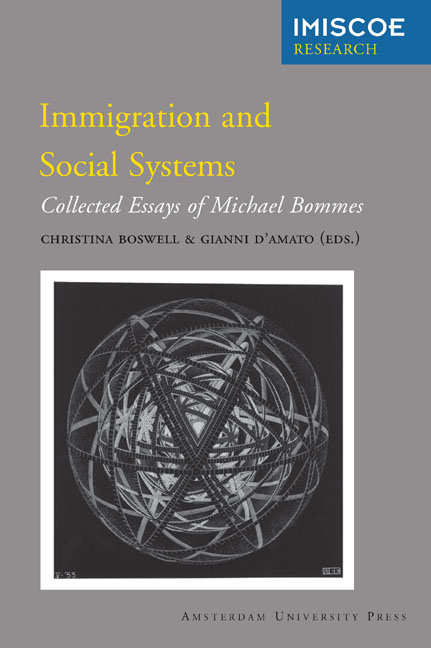Book contents
- Frontmatter
- Contents
- Foreword
- Preface
- Introduction
- 1 Migration in Modern Society
- 2 National Welfare State, Biography and Migration: Labour Migrants, Ethnic Germans and the Re-Ascription Of Welfare State Membership
- 3 Systems Theory and the ‘Ethnic Inequality’ of Migrant Workers
- 4 Welfare Systems and Migrant Minorities: The Cultural Dimension of Social Policies and its Discriminatory Potential
- 5 Transnationalism or Assimilation?
- 6 ‘Integration takes Place Locally’: On the Restructuring of Local Integration Policy
- 7 Illegal Migration in Modern Society: Consequences and Problems of National European Migration Policies
- 8 General and Specific Characteristics of Networks: (with Veronika Tacke)
- 9 National Paradigms of Migration Research: (with Dietrich Thränhardt)
- References
- Other IMISCOE Titles
4 - Welfare Systems and Migrant Minorities: The Cultural Dimension of Social Policies and its Discriminatory Potential
Published online by Cambridge University Press: 09 January 2021
- Frontmatter
- Contents
- Foreword
- Preface
- Introduction
- 1 Migration in Modern Society
- 2 National Welfare State, Biography and Migration: Labour Migrants, Ethnic Germans and the Re-Ascription Of Welfare State Membership
- 3 Systems Theory and the ‘Ethnic Inequality’ of Migrant Workers
- 4 Welfare Systems and Migrant Minorities: The Cultural Dimension of Social Policies and its Discriminatory Potential
- 5 Transnationalism or Assimilation?
- 6 ‘Integration takes Place Locally’: On the Restructuring of Local Integration Policy
- 7 Illegal Migration in Modern Society: Consequences and Problems of National European Migration Policies
- 8 General and Specific Characteristics of Networks: (with Veronika Tacke)
- 9 National Paradigms of Migration Research: (with Dietrich Thränhardt)
- References
- Other IMISCOE Titles
Summary
The histories of welfare states and international migration in Europe after the Second World War are closely interlinked. The phase of expansion and consolidation of these welfare states from the 1950s until the 1970s was also the major period of post-colonial immigration and active recruitment of labour migrants, which constituted the main paths for subsequent migrations to Europe. The recent efforts of European welfare states to adapt their welfare systems to the challenges of increasing competition in globalised markets are connected internally with policies of migration and integration; they try to restrict access to state territories for migrants seen as insufficiently competitive on the one hand and, on the other, to enforce the social integration of long-term resident migrants as an integral, programmatic part of activating welfare policies. The infrastructure and policy designs of European welfare states still differ, and therefore so do the modes of welfare inclusion and participation of migrants. A shared experience, however, is that large parts of the migrant populations in each country belong to the most disadvantaged groups in terms of access to the labour market, occupational positions and income, educational achievement, housing and health. European welfare states are, however, seen – to a varying extent – as institutions that should provide all individuals living permanently on their territory with the means to overcome disadvantages and gain access to resources that will allow them to share in a commonly accepted standard of living.
The fact, however, that many immigrants in European welfare states remain disadvantaged compared with the indigenous population provides the basis for assumptions that this may be due to unequal treatment – quite a challenge for European welfare states, which claim to be guided by constitutionally embedded universalism and equal and non-discriminatory treatment. Since one of the effects of immigration is cultural and ethnic pluralisation and the formation of ethnic minorities, it is proclaimed that social disadvantages and inequality may well be the outcome of cultural or ethnic discrimination built into the structure of national welfare states.
This chapter deals precisely with this question. Are European welfare states and their social policies impregnated by implicit or explicit cultural models, and do they have discriminatory effects on ethnic minorities concerning their access to welfare provisions and social security?
- Type
- Chapter
- Information
- Immigration and Social SystemsCollected Essays of Michael Bommes, pp. 83 - 106Publisher: Amsterdam University PressPrint publication year: 2013



